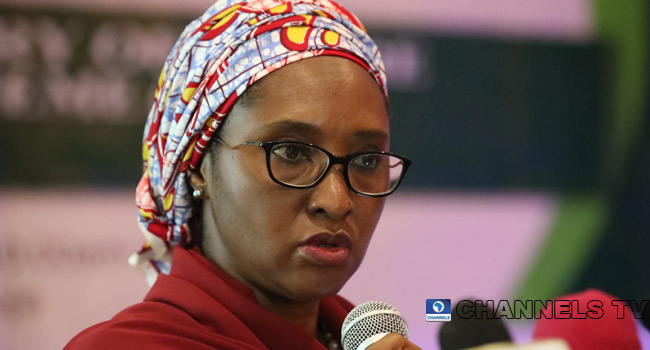The Federal Government wants to scale down the country’s oil benchmark to $30 per barrel for the 2020 budget to mirror the current reality of a depressed oil market.
Crude oil prices have literally crashed following the breakout of the coronavirus pandemic which has has shook the whole world economy, with most business actives shuttered or scaled low as nations battle the unprecedented scourge.
The government had originally set the benchmark at $57 per barrel, which is no longer a realizable target.
The Minister of Finance, Zainab Ahmed, in a meeting with the leadership of the National Assembly on Wednesday, explained that prior to the COVID-19 and oil price decline, the Nigerian economy was already fragile and vulnerable.
According to her, the impact of the pandemic put increasing pressure on the Naira and foreign reserves as the crude oil sales receipts declined and the country’s micro-economic outlook worsened.
Ahmed disclosed that the Federal Government has undertaken cuts to revenue-related expenditures for the Nigerian National Petroleum Corporation (NNPC) for several projects included in the 2020 Appropriation Act passed by the National Assembly in December, 2019.
“Prior to COVID-19 and Oil price decline, the Nigerian economy was already fragile and vulnerable.”
She also told the leadership of the National Assembly that budgeted revenues for the Nigeria Customs Service have been reduced from N1.5 trillion to N943 billion “due to anticipated reduction in trade volumes; and privatization proceeds to be cut by 50 per cent, based on the adverse economic outlook on sales of the Independent Power Projects (IPPs) and other assets.”
Similarly, Ahmed disclosed that the Federal Government has undertaken cuts to Revenue-related expenditures for the Nigerian National Petroleum Corporation (NNPC) for several projects included in the 2020 Appropriation Act passed by the National Assembly in December, 2019.
“The Federal Government is working on Fiscal Stimulus Measures to provide fiscal relief for Taxpayers and key economic sectors; incentivize employers to retain and recruit staff during the economic downturn; stimulate investment in critical infrastructure; review non-essential tax waivers to optimize revenues, and compliment monetary and trade interventions to respond to the crisis,” the Finance Minister disclosed.
Meanwhile, President of the Senate, Ahmad Lawan, said that an immediate review of the 2020 budget and Medium Term Expenditure Framework is imperative, particularly against the backdrop of the impact of the coronavirus pandemic on the global economy.
“If we have to review the budget itself, we have to consider the MTEF/FSP. Even in sickness, we need the government to provide services. The impact of COVID-19 is well known to all of us in terms of health and the economy. Here, we will be talking of revenues that we estimated to fund the budget 2020. Because the oil price has gone so low due to the impact of COVID-19, the Minister of State should be able to tell us where we will be in the next six months or so.
“We should have concepts that can deliver fast and are sustainable. Anything that we do that cannot provide succor and relief to our people will lead to catastrophe,” the Senate President warned.














